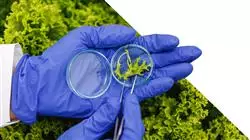University certificate
The world's largest faculty of nutrition”
Introduction to the Program
This Postgraduate certificate will allow you to contribute to the construction of plans for the prevention and control of Microbial Foodborne Diseases"

Food microbiology deals with the study of microorganisms that cause health problems to the body, so its field of study continues to be of great relevance to ensure the protection of public welfare. In addition, since these diseases are caused by the consumption of food in poor condition or with an incorrect handling process, the implementation of alternatives based on the knowledge offered by research in this area should be carried out by specialists.
With the above in mind, this Postgraduate certificateprogram is focused on students not only to gain profound knowledge related to the specificity of this field, but also to increase their professional skils, which will strengthen their strategic vision. In this way, students will acquire a complete perspective of the current demands and challenges of this sector.
In addition, the study plan offers a wide range of knowledge related to Microbial Foodborne Diseases, including the main techniques used in microbiology, sterilization and asepsis, the different culture media and the preparation of samples for microscopic observation. The microbial alterations that occur in food, the factors that influence the alteration of microorganisms and the methods of preservation and control will also be analyzed.
All of this is based on the innovative Relearning methodology, which allows this program to be taught 100% online, a benefit that will allow students to study from anywhere, have greater time flexibility and have access to multimedia resources 24 hours a day. In addition, they will enhance their skills and strengthen their problem-solving skills, since they will analyze practical cases that will place them in the simulation of a real environment.
If you want to stand out in your professional field, TECH will provide you with the best knowledge to be the best"
This Postgraduate certificate in Microbial Foodborne Diseases contains the most complete and up-to-date scientific program on the market. The most important features include:
- The development of case studies presented by experts in Foodborne Microbial Diseases
- The graphic, schematic and eminently practical contents with which it is conceived gather scientific and practical information on those disciplines that are indispensable for professional practice
- Practical exercises where self-assessment can be used to improve learning.
- Its special emphasis on innovative methodologies
- Theoretical lessons, questions to the expert, debate forums on controversial topics, and individual reflection assignments
- Content that is accessible from any fixed or portable device with an Internet connection
Do you want to grow your career? This is the best opportunity to achieve it and become an expert in Foodborne Diseases"
The program’s teaching staff includes professionals from the field who contribute their work experience to this educational program, as well as renowned specialists from leading societies and prestigious universities.
The multimedia content, developed with the latest educational technology, will provide the professional with situated and contextual learning, i.e., a simulated environment that will provide immersive education programmed to learn in real situations.
This program is designed around Problem-Based Learning, whereby the professional must try to solve the different professional practice situations that arise during the course. For this purpose, students will be assisted by an innovative interactive video system created by renowned and experienced experts.
From the comfort of your home and with the technological device of your choice, you will be able to expand your knowledge about Foodborne Diseases"

Salmonella is a disease that seriously affects elderly patients and with this program, you will be able to create strategies to help avoid this bacterium during food handling"
Why study at TECH?
TECH is the world’s largest online university. With an impressive catalog of more than 14,000 university programs available in 11 languages, it is positioned as a leader in employability, with a 99% job placement rate. In addition, it relies on an enormous faculty of more than 6,000 professors of the highest international renown.

Study at the world's largest online university and guarantee your professional success. The future starts at TECH”
The world’s best online university according to FORBES
The prestigious Forbes magazine, specialized in business and finance, has highlighted TECH as “the world's best online university” This is what they have recently stated in an article in their digital edition in which they echo the success story of this institution, “thanks to the academic offer it provides, the selection of its teaching staff, and an innovative learning method aimed at educating the professionals of the future”
A revolutionary study method, a cutting-edge faculty and a practical focus: the key to TECH's success.
The most complete study plans on the university scene
TECH offers the most complete study plans on the university scene, with syllabuses that cover fundamental concepts and, at the same time, the main scientific advances in their specific scientific areas. In addition, these programs are continuously being updated to guarantee students the academic vanguard and the most in-demand professional skills. In this way, the university's qualifications provide its graduates with a significant advantage to propel their careers to success.
TECH offers the most comprehensive and intensive study plans on the current university scene.
A world-class teaching staff
TECH's teaching staff is made up of more than 6,000 professors with the highest international recognition. Professors, researchers and top executives of multinational companies, including Isaiah Covington, performance coach of the Boston Celtics; Magda Romanska, principal investigator at Harvard MetaLAB; Ignacio Wistumba, chairman of the department of translational molecular pathology at MD Anderson Cancer Center; and D.W. Pine, creative director of TIME magazine, among others.
Internationally renowned experts, specialized in different branches of Health, Technology, Communication and Business, form part of the TECH faculty.
A unique learning method
TECH is the first university to use Relearning in all its programs. It is the best online learning methodology, accredited with international teaching quality certifications, provided by prestigious educational agencies. In addition, this disruptive educational model is complemented with the “Case Method”, thereby setting up a unique online teaching strategy. Innovative teaching resources are also implemented, including detailed videos, infographics and interactive summaries.
TECH combines Relearning and the Case Method in all its university programs to guarantee excellent theoretical and practical learning, studying whenever and wherever you want.
The world's largest online university
TECH is the world’s largest online university. We are the largest educational institution, with the best and widest online educational catalog, one hundred percent online and covering the vast majority of areas of knowledge. We offer a large selection of our own degrees and accredited online undergraduate and postgraduate degrees. In total, more than 14,000 university degrees, in eleven different languages, make us the largest educational largest in the world.
TECH has the world's most extensive catalog of academic and official programs, available in more than 11 languages.
Google Premier Partner
The American technology giant has awarded TECH the Google Google Premier Partner badge. This award, which is only available to 3% of the world's companies, highlights the efficient, flexible and tailored experience that this university provides to students. The recognition as a Google Premier Partner not only accredits the maximum rigor, performance and investment in TECH's digital infrastructures, but also places this university as one of the world's leading technology companies.
Google has positioned TECH in the top 3% of the world's most important technology companies by awarding it its Google Premier Partner badge.
The official online university of the NBA
TECH is the official online university of the NBA. Thanks to our agreement with the biggest league in basketball, we offer our students exclusive university programs, as well as a wide variety of educational resources focused on the business of the league and other areas of the sports industry. Each program is made up of a uniquely designed syllabus and features exceptional guest hosts: professionals with a distinguished sports background who will offer their expertise on the most relevant topics.
TECH has been selected by the NBA, the world's top basketball league, as its official online university.
The top-rated university by its students
Students have positioned TECH as the world's top-rated university on the main review websites, with a highest rating of 4.9 out of 5, obtained from more than 1,000 reviews. These results consolidate TECH as the benchmark university institution at an international level, reflecting the excellence and positive impact of its educational model.” reflecting the excellence and positive impact of its educational model.”
TECH is the world’s top-rated university by its students.
Leaders in employability
TECH has managed to become the leading university in employability. 99% of its students obtain jobs in the academic field they have studied, within one year of completing any of the university's programs. A similar number achieve immediate career enhancement. All this thanks to a study methodology that bases its effectiveness on the acquisition of practical skills, which are absolutely necessary for professional development.
99% of TECH graduates find a job within a year of completing their studies.
Postgraduate Certificate in Microbial Foodborne Diseases
In this Postgraduate Certificate, you will learn about the main microorganisms that can cause foodborne diseases, as well as the conditions that favor their proliferation. In addition, you will become familiar with disease prevention and control measures in food production, from the farm to the consumer's plate.
At the end of the Postgraduate Certificate, you will have the necessary knowledge to take preventive measures in your home, workplace or in the food industry, allowing you to enjoy safe food and avoid illnesses. Enroll now in the Postgraduate Certificate in Microbial Foodborne Diseases and learn how to prevent foodborne diseases!
Become an expert in food safety
The Postgraduate Certificate in Microbial Foodborne Diseases is an excellent opportunity to become an expert in food safety. Through this Postgraduate Certificate, you will acquire the knowledge necessary to understand how foodborne illnesses are spread and how to prevent them. In addition, you will learn about the main microorganisms that can cause diseases, as well as the conditions that favor their proliferation.
In this Postgraduate Certificate, you will also learn about the rules and regulations governing food production and distribution, as well as disease control and prevention measures. This will enable you to apply proper practices in food handling and preparation, and ensure food safety for the end consumer.
At the end of the Postgraduate Certificate, you will be equipped with the knowledge necessary to work in the food industry or to implement food safety measures in your home or workplace. Enroll today in the Postgraduate Certificate in Microbial Foodborne Diseases and become a food safety expert!







